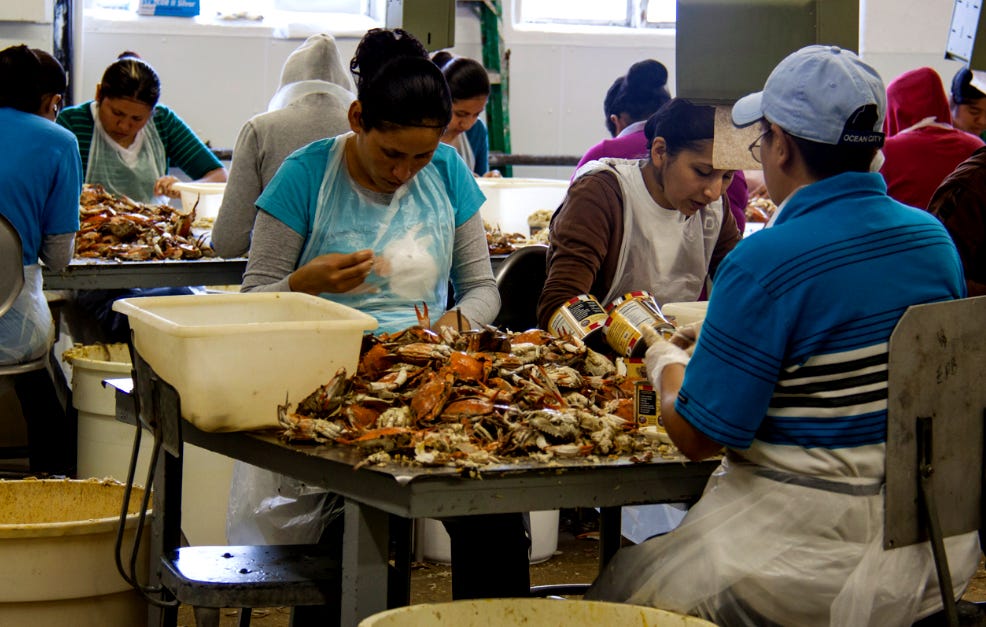Trump suddenly 'woke' to the value of immigrants?
Their work has long been essential to the U.S. economy, from home construction to child care to crab picking
I see where Trump is now “woke” to the idea that immigrants, including undocumented ones, are essential to farming and the hospitality industries. As The New York Times reports:
The Trump administration has abruptly shifted the focus of its mass deportation campaign, telling Immigration and Customs Enforcement officials to largely pause raids and arrests in the agricultural industry, hotels and restaurants, according to an internal email and three U.S. officials with knowledge of the guidance.
Of course, blinded by his racism, Trump has been oblivious to a fact of American life most of us have long understood — without immigrants, fruits and vegetables do not get picked, highways do not get paved, hotel rooms do not get cleaned, homes do not get built in a timely way, restaurant service lags, lawns do not get mowed.
I could go on, so I will . . .
Shrubs do not get mulched, houses do not get painted, potholes do not get patched, herbs do not get stuffed in those little plastic packages you see in the grocery store, some children and elderly parents do not receive daily care . . .
Back in 2016, when candidate Trump promised that the country would see 4% growth, a chorus of economists said no way that would happen without more infrastructure spending and more — not fewer — foreign-born laborers. They were needed to make the nation more productive.
Additionally, various experts said that amnesty and a path to citizenship for undocumented workers already here would eventually lead to a better educated and more productive workforce.
Trump listened to none of that. Instead, he and Stephen Miller have fueled fears of increased crime, pledged mass deportation and turned ICE goon squads loose on immigrants who work and obey our laws.
If you listen to MAGA messaging, you still hear the tired and fallacious claim that immigrants steal jobs from American citizens.
I first took a dive into this subject several years ago and came across studies about immigration’s effect on labor markets and found one, by an economist named Giovanni Peri, that specifically addressed the issue of displacement.
Peri, a professor at the University of California at Davis, was a visiting scholar at the Federal Reserve Bank of San Francisco at the time of his study. His data dive was 50 years deep, back to the 1960s, and covered several regional labor markets.
Peri found no evidence that immigrants pushed U.S.-born workers out of jobs in either the short term or long run. In fact, his data showed that immigrants took jobs Americans no longer wanted while Americans moved into jobs with better pay and benefits.
That led to a higher standard of living for Americans and their children. Peri estimated that the flow of immigrants into the country from 1990 to 2007 resulted in a general increase of yearly worker income by close to 10%.
Peri gave the example of a construction company that employs immigrant laborers. With a stable and productive workforce, the company finds more opportunities to expand its business and that, in turn, increases the demand for more supervisors, coordinators and other higher-skill positions.
“Those are occupations typically staffed by U.S.-born workers who have moved away from manual construction jobs,” Peri said. “This typically pushes U.S.-born workers toward better-paying jobs, enhances the efficiency of production and creates jobs.”
Because I was writing for The Baltimore Sun at the time, I ran down the example of crab picking. Jobs once performed by Black women in Maryland crab houses are now performed by immigrants, mostly from Mexico. And the children of the former crab pickers have mostly moved on to better jobs, either in skilled labor or in careers requiring college degrees.
“Data show that, on net, immigrants expand the U.S. economy’s productive capacity, stimulate investment and promote specialization that in the long run boosts productivity,” Peri told me. “There is no evidence that these effects take place at the expense of jobs for workers born in the United States.”
In 2022, following the pandemic, Peri estimated that the country was running at an immigrant worker deficit of 2 million, a labor shortage that likely contributed to inflation.
Instead of deporting immigrants and scaring others away, we should fix the immigration system, welcome newcomers and give amnesty to those already here.
In a recent interview with the George W. Bush Presidential Center, Peri said: “Countries that have been able to attract more immigrants are growing faster and becoming wealthier. Immigrants have a broad variety of skills added to that country’s labor market. These are big things that come with immigration to a country that make the economy better.”






Dan, I have been a patient at Johns Hopkins Medicine for 12 years. Many of the specialists, highly trained and competent physicians were not born in this country. Hopkins has 11,000 foreign students. They make my life possible, more interesting and complete.
Thank you for your timely insights!